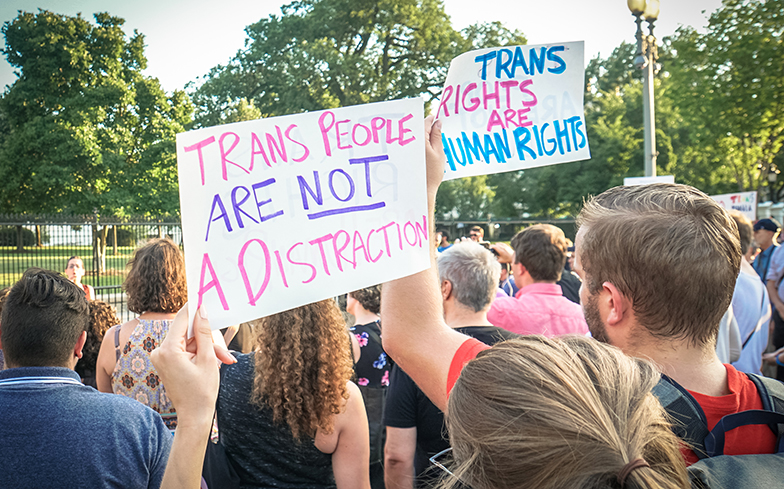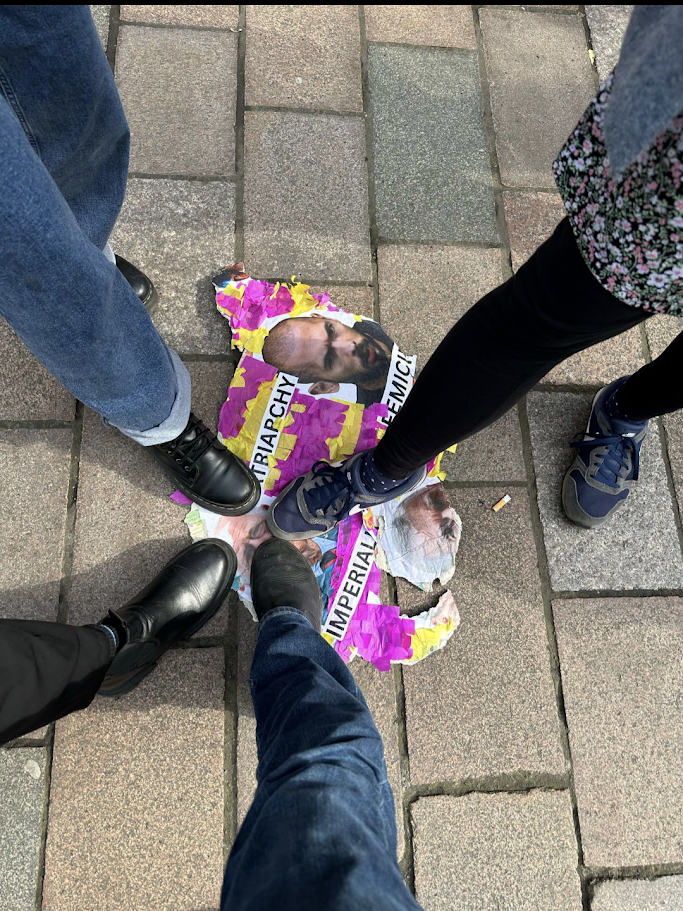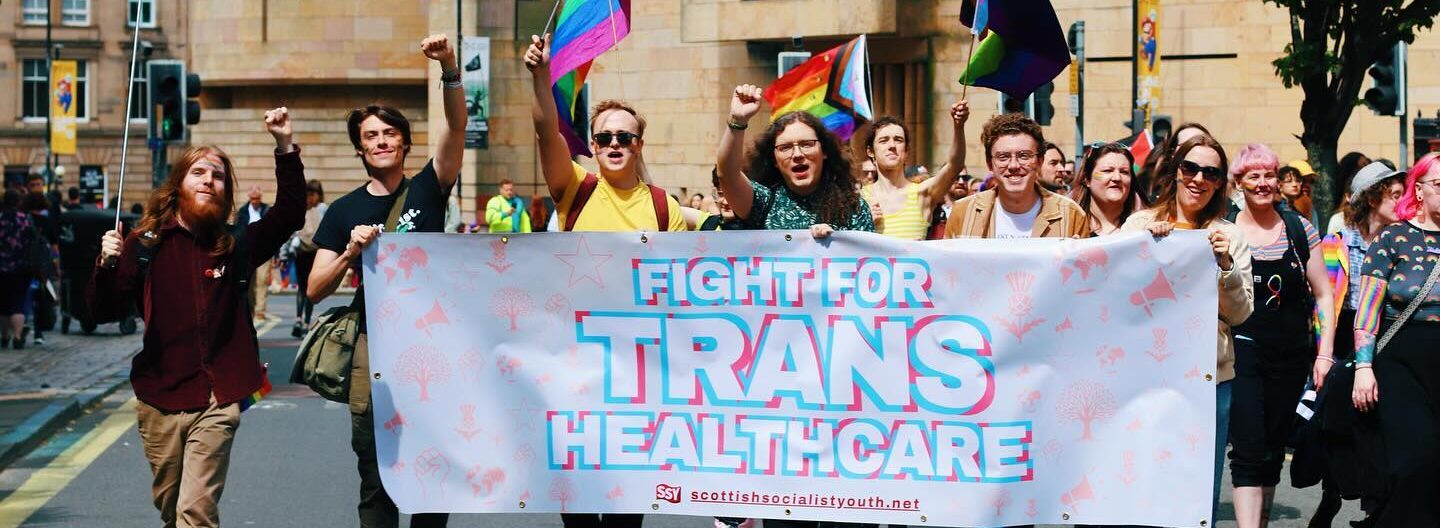Enough time has passed from the UK Supreme Court’s decision on the Equality Act to allow us to properly observe a phenomenon which has been comfortably festering within the British left – transphobia. As it has taken root among the British ruling class and their sympathisers in the media, certain corners of the British left (mostly Marxist-Leninist, but not exclusively so) have seen fit to embrace anti-trans politics in some form or another. Some, such as the Communist Party of Great Britain (CPGB, and Marxist-Leninist themselves) wholeheartedly deny the possibility for trans people to exist, unless it is as some kind of conspiracy or ideological malignancy which prevents real class consciousness. Others, such as the Communist Party of Britain and their youth wing, the Young Communist League (CPB/YCL ) or Counterfire, will handwring about the specifics of the distinction between sex and gender, and acknowledge that trans people exist and do face distinct social and medical issues. However, they ultimately come out on the side of sex-segregationism, adopting what can be called a “gender critical” approach to issues which concern trans people on supposedly “materialist” grounds. The latter poses a greater danger, as its supposed support allows them to have a kind of plausible deniability in public forums. However, the theory and ideology and their core justify themselves in the same way. It’s easy enough to identify this position with Trans Exclusive Radical Feminism, or TERFism, but there are enough important distinctions which allows it to stand on its own as well. I shall refer to this tendency as Left-Transphobia. This delineation is crucial, so that it can be made clear that however much Left-Transphobia attempts to distance itself from TERFism, its results and commitments will ultimately be as anti-trans, and anti-woman, as TERFism is.

A trans rights protest about the Gender Recognition Act. Image Credit: Ted Aytan for Novara Media
Left-Transphobes and “Gender Ideology”
The key concern that Left-Transphobes raise, and attempt to argue is a Marxist idea, is that gender has overtaken sex as a means of understanding the oppression of women. Subsequently, they will then attempt to argue that focusing too much on gender identity can take attention away from class issues and actually end up creating divisions among working-class people. This will be discussed more later. Beyond the typical TERF talking points, Left-Transphobes will present a dichotomy between gender identity, which they define as a subjective and idealist construct, and sex, which they argue is a material, physical reality, and therefore the only way a proper materialist analysis for the oppression of women, and discrimination against trans people, can be done.
When this separation happens, a number of problems with the way that gender can be studied as a social relation, and used as a framework to analyse the world come up, which can only result in left-transphobes reducing it to an ideology. The idea that gender and gender identity cannot exist objectively as a social relation, and form a crucial piece of the system of masculine domination which oppresses women and gender non-conforming people is sidelined. The YCL in particular claims that taking gender and gender-identity seriously as an analytic and determinate factor in society actually takes a step back from feminism, by undermining the claim that “there is no material difference between men and women other than sex.” Left-transphobia defines womanhood by stereotypes, and denies the ways that sex and society actually create those stereotypes in the first place.
This argument doesn’t consider the fact that gender and gender identity are seemingly only ever discussed in relation to biological sex. Whenever someone argues that sex is gendered, it is to point out that gender functions as an articulation between sex and society, and the manner in which it is controlled and regulated. Simply, the argument is that our gender is how we present ourselves to the world in accordance with what the world expects – whether it’s our clothes, mannerisms, or in any number of other ways. The way that gender has a basis of oppression does not separate itself from sex, but expands the manner in which societal sex-oppression happens, through the regulation and surveillance of the body. The understanding of gender as the nexus through which sex is related to class society unveils the social nature of sex and the immutable characteristics which are retroactively projected upon it as biologically determinate and subsequently the means by which divergence from those characteristics is punished and “corrected” or made grounds for social marginalization. Sex is governed through gender and subsequently it is struggled for and against in the domain of gender. Katharine Mackinnon highlights that gender is actually a lens we need to look at sex-oppression through. She argues that society presents sex as a set of immutable characteristics, and doing this means that we automatically start to consider sex as the only thing that defines how we behave. This is what theorists call ‘bioessentialism.’ If sex is innate and unchangeable, that means that who we are is essentially predetermined from the moment of birth, and whatever we learn or experience will make no difference. The way TERFs, and others who campaign against “gender ideology” invoke sex actually becomes an ideology on its own, as it effectively predestines anyone assigned male at birth to becoming a predator. Rather than dismantling what they think of as “gender ideology,” it just creates a separate one.

For women Scotland campaigners leaving the UK SUpreme court follwoing the Equality Act Ruling. IMage Credit: Heute
The end point of left-transphobia
Considering bioessentialism as a cornerstone of materialism plays directly into the hands of the bourgeois state and the reactionary political projects which vie for influence and control over it. This was clearly demonstrated by the CPB’s statement on the Supreme Court’s decision on the definition of a woman in the Equality Act. The statement claims that the decision has no relation to the climate of transphobic politics which has been cultivated and promoted by billionaires and media figures such as J.K. Rowling. As much as they may state that the ruling merely clarifies the lines along which struggles may occur, the political forces that fought to make the ruling happen are virulently anti-trans and, unlike the left-transphobes, believe that trans people do not exist, and that anyone claiming to be trans is an inherently predatory weapon of the patriarchy, set out to infiltrate women’s spaces. Despite these discrepancies, Rowling has personally seen it fit to promote the CPB at various points on social media, on the basis of their stances on gender. Such promotion should be considered an alarm, especially since Rowling has recently suggested placing security cameras in women’s toilets as a means of ensuring that people even suspected of being trans can be kept out. The nature of these suggestions makes it very clear that the goal of TERFism is not to protect women and girls, but to police and enforce gender norms. The call to protect single-sex spaces against “infiltrators” justifies arbitrary harassment or violence against individuals whose physical characteristics or mode of expression may “raise alarm”. These spaces would no longer provide safety or comfort, but function as gendered prisons, enforced either by the state or people motivated to engage in crude vigilante behaviour – all while arguing that what they’re doing is actually a public service.

JK Rowling. Image Credit: Heute
By denying the influence of any “transphobic political climate” in the Supreme Court’s decision, left-transphobes play into an ideology by stripping this struggle of its politics, and basically reducing it to a matter of administration. This completely disregards any kind of influence the state has over ongoing political struggles. Their analysis blurs the lines of what are and aren’t tools of the ruling class, and attempts to direct socialists away from the state.
They conflate the co-optation and production of a compatible ideology of trans acceptance with the struggles of trans people as regards the problems of public space and gender identification, acting as if they are separate from the medical element of trans oppression entirely. In doing so, they recreated an inverted form of the pinkwashed corporate ideologies of acceptance they rail against by asking us to give in to those elements of the ruling class incensed by the existence of trans people. This provides neither cis nor trans workers a clear picture of the struggle between workers and owners, and infects both groups with a logic of lesser evilism that transforms the fight for liberation into a battle between the factions of the bourgeois. We cannot deny the inability for queer theory or corporate driven initiatives for acceptance to produce any kind of coherent practice that does not result in tailing one aspect of the ruling class over another. To abandon any and all critiques or expansion of the scope of our analysis however is foolish. The goals and achievements of the forces that left-transphobia serves have proven quite clearly the validity of gender as a basis of oppression for trans and cis people alike.
In a world where the existence of transgender people becomes an unavoidable reality, the denial of their rights and dignities can only amount to a campaign of social murder. The struggle against “gender ideology” by TERFs remains inseparable from a movement to erase trans people from the public sphere entirely. Attempting to kowtow to such forces under the notion that they may clear the path to liberation, betrays the cause of liberation. It chases a working class imagined and produced by the most reactionary elements in Britain with the hope that they may be convinced that communism serves not to emancipate but bludgeon and subordinate the most vulnerable segments of its population. In the name of unity, left-transphobes will happily indulge the same strategy of divide and conquer which has kept us from the successful pursuit of revolution. We must learn that if trans’ liberation is unthinkable without communism, communism is unthinkable without trans liberation.








